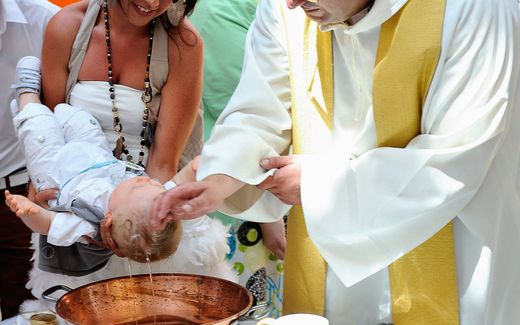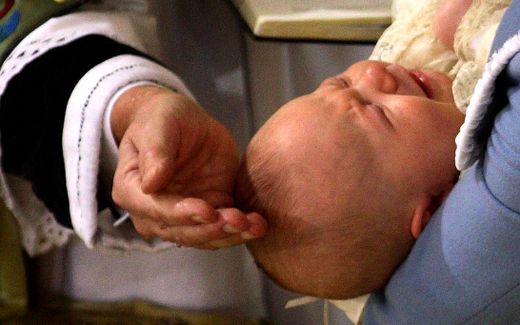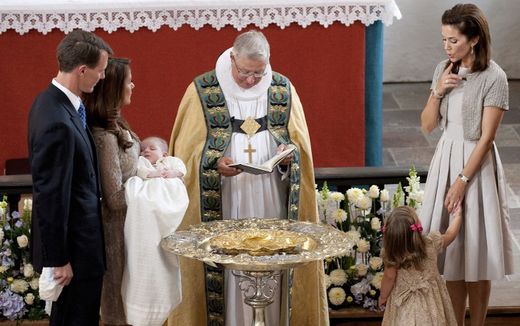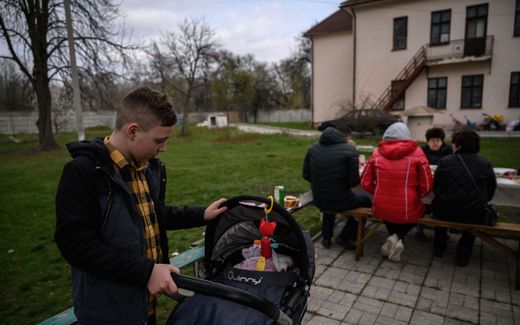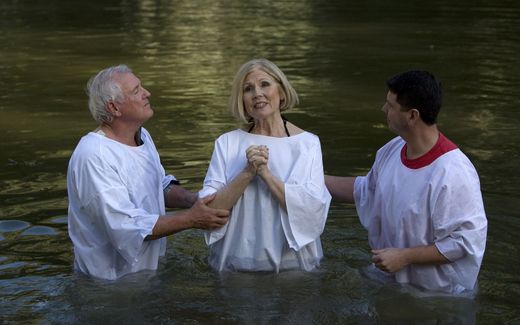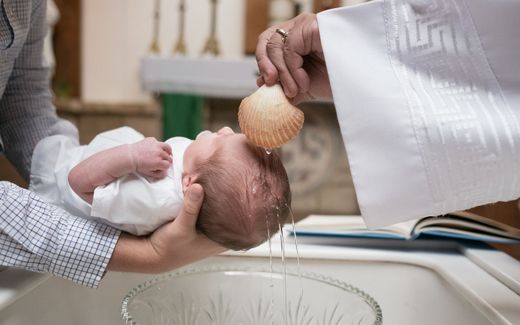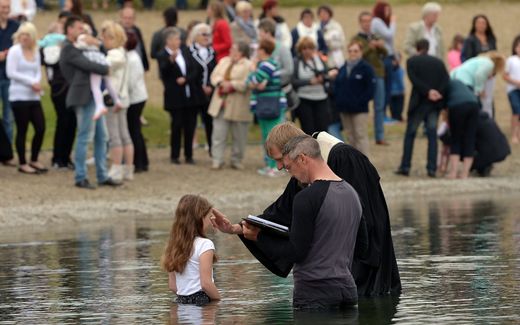Drop-in baptism is no “cheap sacrament”
21-04-2023
Central Europe
Anna Lutz, PRO
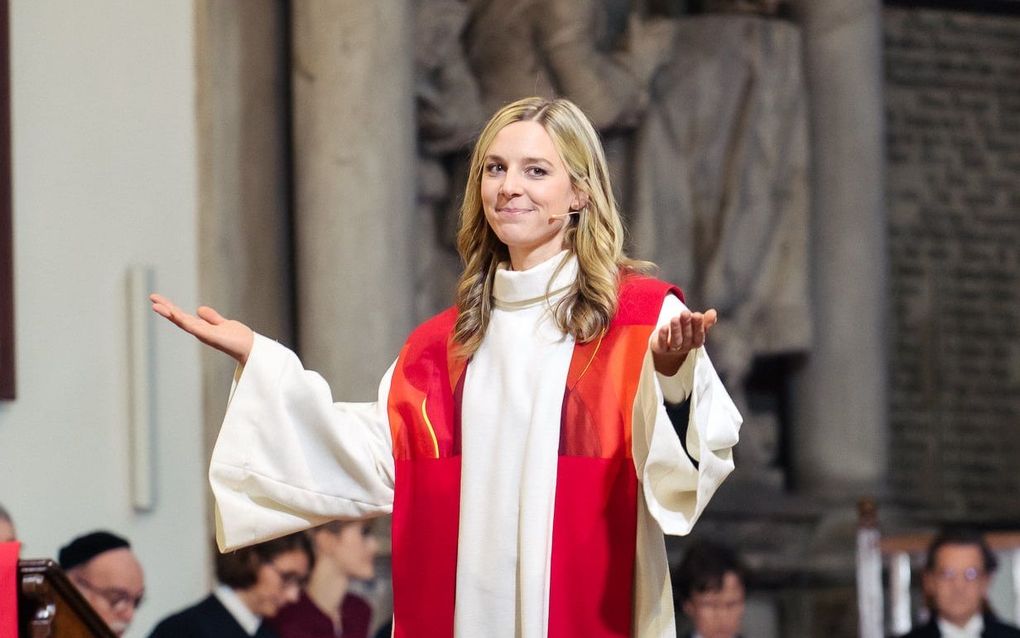
Pastor Corinna Zisselsberger performs drop-in baptisms. Photo Facebook, EKBO
Central Europe
In a Berlin church, pastor Corinna Zisselsberger baptises people spontaneously once a month: without a baptism course or a long period of getting to know each other. Drop-in baptism is the name of the concept that is catching on and apparently reaching people.
St. Mary's Church on Alexanderplatz. Outside, the S-Bahn rushes past; inside, there are the usual passer-by. Tourists step through the heavy doors of the ancient building, take photos, and stand in front of the paintings depicting biblical stories.
But at the front of the church's choir room, just behind the pulpit, something quite different is happening. Something you would not expect to see here on a Wednesday morning: a group of adults stands around the baptismal font, including three clergies in gowns. The mood is contemplative and relaxed at the same time.

A few minutes ago, six men and women were baptised here. Right on the spot. The concept is called drop-in baptism. Since the beginning of the year, St. Mary's Church has been offering this option once a month for one hour – and it is always fully booked during this period. A sacred act in the middle of the city hustle and bustle?
Pastor Zisselsberger, you and your colleagues baptised six people today. On a perfectly normal Wednesday in the middle of Berlin's Marienkirche on Alexanderplatz, near the TV tower. What was that like for you as a pastor?
Corinna Zisselsberger: “Highly emotional. Spiritual. Touching. Baptisms are always like that; they are a ritual that has had power for 2,000 years.
Here in this church, the whole thing is condensed because the people come spontaneously; we get to know them within maybe 30 minutes and then baptise them immediately. Beforehand, we hold a baptismal interview, either by telephone or directly beforehand here on site. The baptism ceremony, including songs, prayer and baptismal verses, takes about 35 minutes. Despite this spontaneity, I always experience how much depth is created in this short time.”
There are a lot of passers-by in the church, tourists take photos, and it is not necessarily quiet. Doesn't that bother you?
"Not me. Firstly, we don't notice it in the choir room, and secondly, it also happens during the Sunday services. But even if we did notice it, it's part of this place, and the people who are baptised here choose this ritual deliberately. Besides the fact that this is a tourist site, this is the oldest church in Berlin, 750 years old, a busy place, as I like to say."
Drop-in baptisms have been available since this year. A particularly low-threshold type of baptism, no baptism course is necessary, just a short preliminary talk. Is this a new way of recruiting members for a shrinking church?
"Sure, it's membership recruitment. But that doesn't make baptism any less valuable. We are not giving away a cheap sacrament here.
People come with a serious wish, and we fulfil it. We also know from the surveys that most people have genuine personal faith and are looking for spiritual paths but are turning towards institutional forms. So it is positive if we turn to the people and the reality of their lives instead of simply doing everything the way we have always done. That is in the spirit of Jesus."
Sounds like criticism of the traditional church…
"In my opinion, the church is often too cerebral and rigid. We appeal to a certain educated middle-class milieu. And we are good at that. But at the same time, we are also narrowed down to this audience. But the times are forcing us to make progressive changes to the system. I am thinking of new membership models, for example. Or creating opportunities for people to have new experiences with old rituals. Baptism, for example."
The concept is working: The last two dates of the pop-up baptisms were fully booked. What kind of people are you baptising there?
"Some don't want to be baptised in their own church because they find it intimidating. Or they are looking for a form that is not a big Sunday service. Many come alone – there is a shyness about family celebrations or the like. Others have put off their baptism because of Corona. Still, others have had bad experiences with the church. Some have let their decision mature for many years and now feel: It is time. Occasionally, formal reasons also play a role: you want to be a godparent for a child and have to become a member for that, for example."
Do you also receive criticism for this spontaneous baptism?
"The criticism is often that people don't know what they are getting into. But we have not yet had that experience here. Most of those baptised here have thought about it for a long time beforehand or have been toying with the idea for a long time. They simply lacked a certain impulse, which we provide with the possibility of drop-in baptism.
Others, also from the ecumenical environment, criticise us for taking away the meaning of the ritual. But that does not correspond to my experience. I do not have the feeling that something is lost. The power of baptism also unfolds when we do it spontaneously here at noon. And it is one offer among many. We also continue to do classical baptism courses and baptism in the Sunday service."
Would there be a reason why you would reject someone?
"There are formal reasons: I had a request the other day from someone who had already been baptised and wanted to be baptised again. That is impossible, but in his case, it could be cleared up quickly, and he has now re-entered. Or if someone says they don't want to become a church member and pay church taxes, I can't baptise them, either. If someone comes who is psychotic or otherwise burdened, for example, then it could be that I draw a line.
But we decide that on a case-by-case basis, and I think we, as pastors, have a good eye for that. Basically, everyone who wants to be baptised should be able to be baptised. If the development continues like this, it could happen that at some point, we have too many baptised people for our midday format. But I would rather see that as a luxury problem in the church, and then I simply invite people to the next baptism."
Some free churches have long since decided to throw traditions overboard. There is pop music in the service, baptisms in a paddling pool, and a modern audience address. Is that a model for you?
"For St. Mary's, a classical form works best. I come from Baden-Württemberg and am, therefore, quite familiar with Pietism. Some of the things I got to know there as a young person I find good, but some I also reject. Big conversion meetings seem weird to me today. The moralism. I always had such a feeling of pressure there. And I don't want that for my church. I want people to experience freedom here and to be able to come as they are."
What does the future of the church look like?
"One thing is certain: we have to try out, experiment, without knowing where we will end up. I would like a place like St. Mary's to stay. But we will not keep all church places and buildings. We have to be prepared for that. The personal relationship plays a much greater role compared to this and will continue to do so in the future. I am convinced that the message of God's love will continue to exist and be carried."
This article was translated by CNE.news and published by PRO on April 6, 2023
Related Articles

